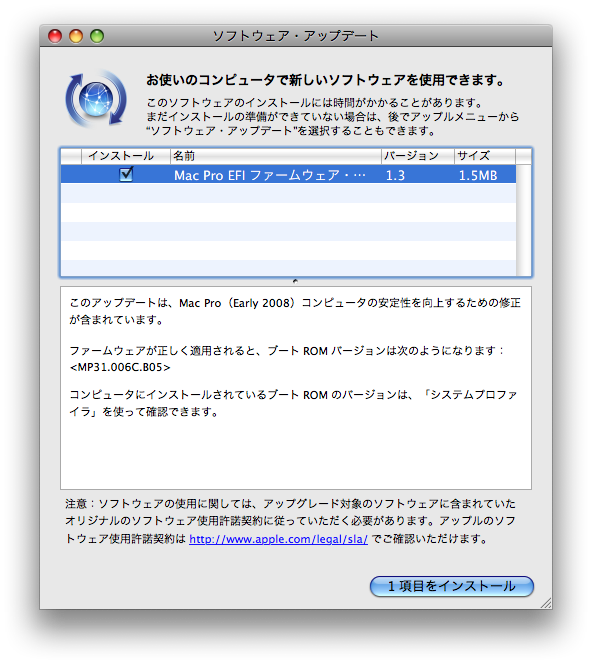
- MAC PRO EFI FIRMWARE UPDATE USB HOW TO
- MAC PRO EFI FIRMWARE UPDATE USB MAC OS
- MAC PRO EFI FIRMWARE UPDATE USB FULL
- MAC PRO EFI FIRMWARE UPDATE USB PRO
Macs, although they're (sort of) EFI-based, are weird Apple's EFI implementation looks first to the Mac's HFS+ root ( /) partition for a boot loader. I believe that what you mean when you write "EFI" is EFI System Partition (ESP), which is where EFI boot loaders reside on most EFI-based computers.
MAC PRO EFI FIRMWARE UPDATE USB MAC OS
Note: I was able to get back in to Ubuntu, by rebooting, and "trying Ubuntu" from my flash drive, and then logging in to my encrypted hard drive, but I no longer have Mac OS installed on my computer, so solutions that involve having mac os installed, while not impossible, are not easy.ĮFI is a type of firmware. So my question is this, is there an EFI that I can set up from Ubuntu, that will be recognized by a Macbook hardware, and run on startup? Looking into it, I believe what I need, is an EFI that I can set up from my newly created Ubuntu partition. I can get through the installation process just fine, but when it comes time to reboot, I run into the blank white screen followed by a flashing folder with a question mark on it. I tried installing Mac OS first, and then setting up a second partition, and creating a refit partition, and then deleting the first partition, but the Ubuntu installer won't let me encrypt my hard drive if I do it that way. Now, I am trying to setup Ubuntu exclusively, and also trying to encrypt my hard drive.
MAC PRO EFI FIRMWARE UPDATE USB PRO
I am installing Ubuntu 13.10 onto a Macbook pro 9.2 I have done this twice before, with the caveat being that, when I did this before, I just set up a dual boot. If someone has a better different way to do this, that would be much appreciated as well.


where maybe you are not allowed to disable "Full Security" mode? I'm not sure you how you can verify within macOS the status of the "Secure Boot" or "Full Security" feature.I'm going to describe my problem in full, and then ask the question for the solution that I think I've come up with. Is your Mac being managed by a business or school or with FindMy, etc. Q & A is lacking with the Security Utility.
MAC PRO EFI FIRMWARE UPDATE USB HOW TO
Apple needs to hire someone who knows how to test software implementations to make sure they work smoothly. The other option is to click Startup Disk and select a different startup disk, which the Mac then attempts to verify.įYI, I did have trouble re-enabling "Full Security" since macOS Security Utility seems to be poorly designed and is not intuitive at all. Clicking Update opens the macOS installer, which can then be used to reinstall macOS on the startup disk. MacOS: The system alerts you that a software update is required to use the startup disk. If the operating system doesn’t pass verification, the following happens: That information is unique to each Mac and is used to make sure that the Mac is starting up from an OS that is trusted by Apple.Īn internet connection is required for verification of an unknown or non-legitimate operating system, so make sure that the Mac is connected to a Wi-Fi network or Ethernet. If the OS is either unknown or not verified as legitimate, the Mac connects to Apple to download the information it needs to verify the OS. As the Mac starts up, it verifies the integrity of the operating system on the startup disk to ensure that it is legitimate.
MAC PRO EFI FIRMWARE UPDATE USB FULL
The three settings available for Secure Boot are Full Security, Medium Security and No Security.įull Security Full Security provides the same level of security as iOS devices, and it is the default setting for Secure Boot.

Here is an OWC blog entry that mentions the error you are seeing and it is associated with macOS and T2 security itself and should have nothing to do with Linux (since I believe this occurs when re-enabling "Full Security": At least with a 2017 MBPro I did have working WiFi. Either macOS support is not included in this kernel or the macOS support was not enabled by default if the macOS support are considered experimental features.

The external Debian drive booted just fine, but I had no access to the built-in Keyboard, Trackpad, WiFi, or Ethernet. I just tried booting Debian 10 Buster with a backported kernel v5.7 and it did not work well for a T2 MBPro 2019.


 0 kommentar(er)
0 kommentar(er)
